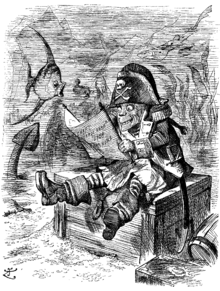Davy Jones's locker
| Davy Jones' locker | |
|---|---|
 Davy Jones' Locker, by John Tenniel, 1892 | |
| First appearance | Four Years Voyages of Capt. George Roberts (1726) |
| Genre | Nautical folklore |
| In-universe information | |
| Type | Euphemism for oceanic abyss, the resting place for sailors drowned at sea. |
| Characters | Davy Jones |

Davy Jones' locker is a metaphor for the oceanic abyss, the final resting place of drowned sailors and travellers. It is a euphemism for drowning or shipwrecks in which the sailors' and ships' remains are consigned to the depths of the ocean (to be sent to Davy Jones' Locker).
The origins of the name of Davy Jones, the sailors'
History
The earliest known reference of the negative connotation of Davy Jones occurs in The Four Years Voyages of Capt. George Roberts, by Daniel Defoe, published in 1726 in London.
Some of Loe's Company said, They would look out some things, and give me along with me when I was going away; but Ruffel told them, they should not, for he would toss them all into Davy Jones's Locker if they did.[2]
An early description of Davy Jones occurs in Tobias Smollett's The Adventures of Peregrine Pickle, published in 1751:[3]
This same Davy Jones, according to sailors, is the fiend that presides over all the evil spirits of the deep, and is often seen in various shapes, perching among the rigging on the eve of hurricanes:, ship-wrecks, and other disasters to which sea-faring life is exposed, warning the devoted wretch of death and woe.[3]
In the story, Jones is described as having saucer eyes, three rows of teeth, horns, a tail, and blue smoke coming from his nostrils.
Proposed origins of the tale
"During many years of seafaring life, I have frequently considered the origin of this phrase, and have now arrived at the conclusion that it is derived from the scriptural account of the prophet Jonah. The word 'locker', on board of ship, generally means the place where any particular thing is retained or kept, as "bread locker", "shot locker", "chain locker", &c. In the sublime ode in the second chapter of the Book of Jonah, we find that the prophet, praying for deliverance, described his situation in the following words:—"in the midst of the seas; and the floods compassed me about; the depth closed me round about; the earth with her bars was about me." The sea, then, might not be misappropriately termed by a rude mariner, Jonah's locker—that is, the place where Jonah was kept or confined. Jonah's locker, in time, might be readily corrupted to Jones's locker; and Davy, as a very common Welsh accompaniment of the equally Welsh name, Jones, added, the true derivation of the phrase having been forgotten."
—W. Pinkerton
Notes and Queries: Vol. III, No. 86, page 478, Saturday, June 21. 1851.[4]
The origin of the tale of Davy Jones is unclear, and many conjectural[5] or folkloric[6] explanations have been told:
- Written within a foreign affairs segment within the newspaper 'Chester Chronicle' in 1791, the term 'Safe in Davy Jones's locker' was used to convey that a person was lost, therefore to be within Davy Jones's locker was to be lost at sea.[8]
- The 1898 Dictionary of Phrase and Fable connects Davy to the West-Indian duppy (duffy) and Jones to biblical Jonah:The reference to duppy/duffy was deleted in later revisions of Brewer's dictionary.
He’s gone to Jones' locker, i.e. he is dead. Jones is a corruption of Jonah, the prophet, who was thrown into the sea. Locker, in seaman’s phrase, means any receptacle for private stores; and duffy is a ghost or spirit among the West Indian negroes. So the whole phrase is, "He is gone to the place of safe keeping, where duffy Jonah was sent to.
— E. Cobham Brewer[3] - David Jones, a real pirate, although not a very well-known one, living on the Indian Ocean in the 1630s.[9]
- Duffer Jones, a notoriously myopic sailor who often found himself overboard.[10]
- A British pub owner who supposedly threw drunken sailors into his ale locker and then gave them to be drafted on any ship.[6]
- Linguists consider it most plausible that Davy was inspired by Saint David of Wales, whose name was often invoked by Welsh sailors, and Jones by the Biblical Jonah.[11]
Reputation

Not all traditions dealing with Davy Jones are fearful. In traditions associated with sailors crossing the Equatorial line, there is a "raucous and rowdy" initiation presided over by those who have crossed the line before, known as shellbacks, or Sons of Neptune. The eldest shellback is called King Neptune, and Davy Jones is to be re-enacted as his first assistant.[12]
Use in media
19th century
in 1812, a musical pantomime 'Davy Jones's Locker, Or Black ey'd Susan' was performed at London's West End theatre; Sans Pareil, known today as Adelphi Theatre.[13]
20th century

In the 1930 cartoon "The Haunted Ship", from the Aesop's Fables series, Davy Jones is depicted as a living skeleton wearing a pirate's bicorne hat.
Raymond Z. Gallun's 1935 science fiction story "Davey Jones' Ambassador" tells of a deep-sea explorer in his underwater capsule who comes in contact on the seabed with a deep-sea culture of underwater creatures.
Theodore Sturgeon's 1938 short story "Mailed Through a Porthole", about a doomed freighter, takes the form of a letter addressed to "Mr. David Jones, Esq., Forty Fathoms."
Davy Jones is a character appearing in
Tom Lehrer's 1953 album Songs by Tom Lehrer includes the number "The Irish Ballad," in which one of the stanzas contains the lines "She weighted her brother down with stones / And sent him off to Davey Jones."[15]
The 1959 Broadway musical Davy Jones' Locker with Bil Baird's marionettes had a two-week run at the Morosco Theatre.[16]
In the television series The Monkees 1967 episode "Hitting The High Seas", the character Davy Jones (played by musician Davy Jones) receives special treatment while kidnapped in a ship as he claims to be related to "The Original" Davy Jones, his grandfather. The fact that Jones the musician shared a name with the legendary seafarer has itself led to a number of puns swapping the two in the decades that followed.
21st century
The concept of Davy Jones was combined with the legend of the
The phrase has often been referenced comedically in the animated television series
French singer Nolwenn Leroy recorded a song titled "Davy Jones" for her 2012 album Ô Filles de l'Eau. The English version contains the lines: "Davy Jones, oh Davy Jones / Where they gonna rest your bones / Down in the deep blue sea / Down in the deep blue sea..."
See also
Notes
- ^ Caption: Oh learn a lesson from Joe Gotch - Without a lifebelt he stood watch - "Abandon ship" came over the phones - He now resides with Davy Jones
References
- ^ However, the depicted character is a fake created by Pipes, Perry and Pickle to scare Mr. Trunnion; see: Smollett, Tobias (1751). The Adventures of Peregrine Pickle. London: D. Wilson. p. 66.
- ^ Defoe, Daniel (1726). The four years voyages of capt. George Roberts. Written by himself. p. 89.
- ^ a b c Brewer, E. Cobham (1 January 1898). "Davy Jones's Locker". Dictionary of Phrase and Fable. Retrieved 30 April 2006.
- ^ "The Project Gutenberg". 21 September 2011 – via Project Gutenberg.
- ^ Farmer, John S; Henley, William Ernest (1927). A Dictionary of slang and Colloquial English. pp. 128–129.
- ^ a b Michael Quinion (1999). "World Wide Words". Retrieved 15 January 2013.
- ^ Grose, Francis. 1811. Dictionary of the Vulgar Tongue: A Dictionary of Buckish Slang, University Wit, and Pickpocket Eloquence, 10th ed. Project Gutenberg. Retrieved 2021-11-16.
- ^ Chester Chronicle - Friday 18 November 1791 - https://www.britishnewspaperarchive.co.uk/viewer/bl/0000341/17911118/005/0002
- ISBN 1-85326-384-2.)
{{cite book}}: CS1 maint: location missing publisher (link - ^ Shay, Frank. A Sailor's Treasury. Norton. ASIN B0007DNHZ0.
- ^ "August 22, 2014 Word of the Day: Davy Jones's Locker". Retrieved 23 August 2014.
- ISBN 9781557503305.
- ^ Morning Chronicle - Wednesday 30 December 1812 - https://www.britishnewspaperarchive.co.uk/viewer/bl/0000082/18121230/005/0003
- ^ "lubber". Oxford English Dictionary (Online ed.). Oxford University Press. (Subscription or participating institution membership required.)j
- ^ "The Irish Ballad / Rickety Tickety Tin [Tom Lehrer]". Mainly Norfolk: English Folk and Other Good Music.
- ^ "Davy Jones' Locker @ Morosco Theatre". Retrieved 25 September 2016.
- ^ "Brian Doyle-Murray: Flying Dutchman". IMDB.
- ^ Press, Joy (29 February 2012). "Davy Jones: Four zany moments, from 'Brady Bunch' to 'SpongeBob'". Los Angeles Times.

